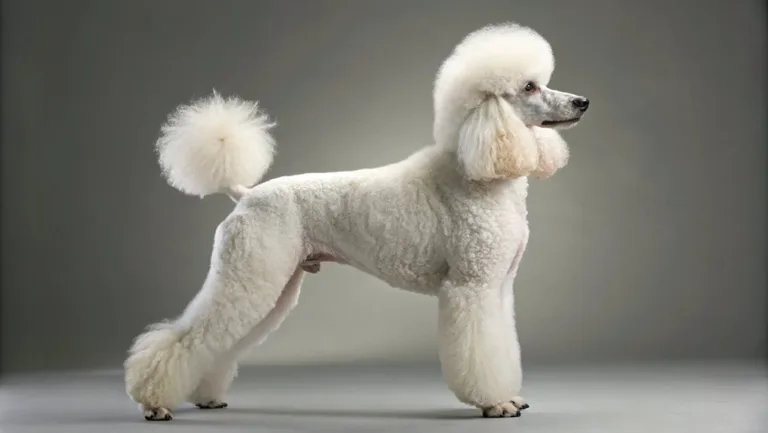Protecting Your Poodle’s Vision: Common Eye Conditions

Poodles can experience several common eye conditions that require vigilant monitoring and care. Progressive Retinal Atrophy (PRA), glaucoma, and cataracts are the most prevalent issues affecting these intelligent dogs.
Early warning signs include night blindness, excessive tearing, redness, and cloudiness in the eyes. Regular veterinary check-ups every six to twelve months help detect problems early, while proper grooming and a nutritious diet support overall eye health.
Responsible breeding practices can reduce inherited conditions, and prompt treatment often leads to better outcomes. Many eye conditions are manageable with proper medical care and attentive ownership. Understanding these conditions is your first step toward keeping those bright poodle eyes healthy and happy.
Key Takeaways
- Poodles can develop Progressive Retinal Atrophy (PRA), which starts with night blindness and gradually progresses to complete vision loss.
- Regular veterinary eye exams every 6-12 months help detect early signs of glaucoma, cataracts, and other vision-threatening conditions.
- Glaucoma, particularly common in Standard Poodles, requires immediate attention when symptoms like redness and excessive tearing appear.
- Keep hair around eyes neatly trimmed and clean any discharge promptly to prevent infections and maintain good eye health.
- Watch for behavioral changes like bumping into furniture or reluctance to play, as these may indicate developing vision problems.
Understanding Progressive Retinal Atrophy

Progressive Retinal Atrophy (PRA) represents one of the most serious inherited eye conditions affecting Poodles. This degenerative disease gradually breaks down the photoreceptor cells in the retina, leading to vision loss and eventual blindness. Genetic factors play a vital role in PRA development, which is why responsible breeding practices are essential for reducing its occurrence.
Early signs of PRA often appear as night blindness, where Poodles may become hesitant to move around in dim lighting. Similar to their regular grooming needs, consistent monitoring of behavioral changes can help detect vision problems early. As the condition progresses, daytime vision also becomes affected.
While there’s currently no cure for PRA, understanding its progression helps owners provide better care for their furry friends. The nutritional impact of a well-balanced diet, particularly one rich in antioxidants, may help support overall eye health, though it won’t prevent or reverse PRA.
Regular veterinary check-ups can help detect PRA in its early stages through specialized eye examinations. While the diagnosis can be concerning, many Poodles adapt remarkably well to vision loss when given proper support and care.
Creating a safe, consistent home environment becomes especially important as vision deteriorates, allowing these resilient dogs to maintain their quality of life. Since Poodles rank among the most intelligent breeds, they can quickly learn to navigate their environment using other senses when vision becomes impaired.
Common Signs of Eye Disease
When it comes to identifying eye problems in Poodles, several telltale signs warrant immediate veterinary attention. If you notice your Poodle displaying redness around the eyes or producing unusual discharge, these could indicate an underlying issue.
Squinting and excessive tearing are also common indicators that something isn’t quite right with your pet’s vision.
Watch for signs of cloudiness in your Poodle’s eyes, as this can signal various conditions requiring professional evaluation. Sensitivity to light often manifests as your dog avoiding bright areas or showing discomfort outdoors.
If you observe your Poodle blinking excessively or pawing at their eyes, these behaviors might indicate irritation or discomfort that needs addressing. Excessive tearing that stains the fur around their eyes can also point to potential problems.
Changes in behavior around the eyes, such as reluctance to play with toys or bumping into furniture, might suggest vision problems. Remember, Poodles are typically alert and coordinated dogs, so any noticeable changes in how they navigate their environment should prompt a veterinary visit.
Early detection and treatment often lead to better outcomes for your furry friend’s eye health.
Glaucoma in Poodles

Glaucoma represents a serious eye condition that can affect Poodles, characterized by increased pressure within the eye that damages the optic nerve. This progressive condition requires prompt attention, as delays in treatment can lead to permanent vision loss.
Regular veterinary health screenings are essential for early detection, especially in Standard Poodles who may face more age-related complications.
Poodles, especially those with a family history of the condition, may be more susceptible to developing glaucoma.
Common glaucoma symptoms include redness, excessive tearing, cloudy cornea, and visible eye pain. You might notice your Poodle pawing at their eye or squinting more than usual. Some Poodles may also become less active or bump into furniture as their vision deteriorates.
Fortunately, several glaucoma treatment options are available. These include eye drops to reduce pressure, oral medications, and in some cases, surgery. Your veterinarian might recommend regular pressure checks to monitor your Poodle’s eye health.
While the condition isn’t curable, early detection and proper management can help preserve your furry friend’s vision. Think of it like maintaining the right pressure in a balloon – too much pressure can cause damage, but keeping it regulated helps protect your Poodle’s precious eyesight.
Just as weekly ear cleaning helps prevent health issues, regular eye examinations are crucial for early detection of glaucoma symptoms.
Managing Cataracts Effectively
Cataract formation in Poodles presents another significant challenge to their ocular health, characterized by a clouding of the eye’s natural lens that can gradually impair vision. Early detection through regular veterinary check-ups allows for better management and treatment planning.
When it comes to managing cataracts, surgical options provide the most effective solution for restoring vision. Modern veterinary medicine offers lens replacement procedures similar to those performed in humans. Additionally, nutritional support through antioxidant-rich supplements can help maintain overall eye health, though they cannot reverse existing cataracts.
| Stage | Symptoms | Recommended Actions |
|---|---|---|
| Early | Slight cloudiness | Regular monitoring |
| Developing | Noticeable opacity | Evaluate surgical timing |
| Mature | Significant vision loss | Consider surgery |
| Advanced | Complete lens opacity | Immediate intervention |
While cataracts can be concerning, the good news is that most Poodles recover well from surgical intervention. Post-operative care includes eye drops, protective collars, and limited activity. With proper management and timely treatment, many Poodles maintain good vision throughout their lives, allowing them to continue enjoying their daily activities and maintaining their playful personalities.
Preventive Care and Regular Checkups

A Poodle’s eye health depends substantially on consistent preventive care and thorough regular examinations. By scheduling routine eye exams with your veterinarian, you can detect potential issues before they become serious problems.
Most veterinary professionals recommend thorough eye checkups every six to twelve months, depending on your Poodle’s age and overall health status. Ear powder application can help prevent moisture-related issues that may affect the area around the eyes.
During these examinations, your vet will check for signs of common eye conditions, including pressure changes, inflammation, or early cataract formation. They’ll also assess tear production and evaluate the retina’s health.
Following veterinary advice about cleaning around your Poodle’s eyes and maintaining proper grooming habits can prevent irritation and infection.
Simple daily practices make a big difference in maintaining your Poodle’s eye health. Keep the hair around their eyes neatly trimmed, clean any discharge promptly with pet-safe wipes, and watch for signs of squinting or excessive tearing.
Lighter-colored Poodles require extra attention to prevent skin irritations around the eye area.
If you notice any changes in your Poodle’s eyes or vision, don’t wait for the next scheduled checkup – contact your veterinarian right away. Remember, when it comes to eye health, prevention is always better than treatment.
Conclusion
Regular eye examinations and early detection remain vital for maintaining a poodle’s vision health throughout life. Through proper veterinary care, diet, and preventive measures, many common eye conditions can be successfully managed or treated.
While eye diseases like PRA, glaucoma, and cataracts present challenges, modern veterinary medicine offers numerous options for extending and preserving vision quality. A proactive approach to eye care helps guarantee poodles maintain healthy sight well into their senior years.






